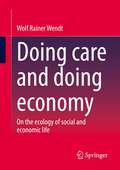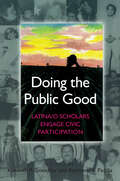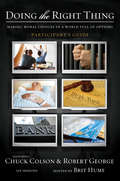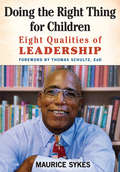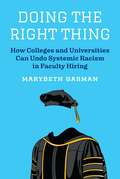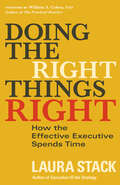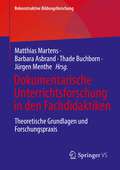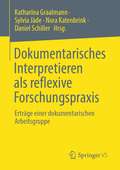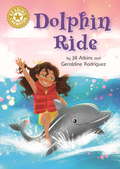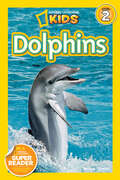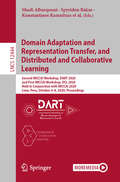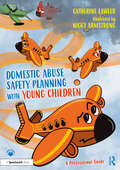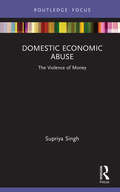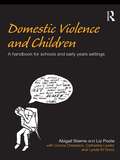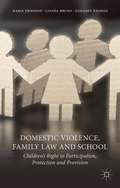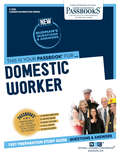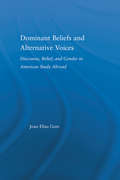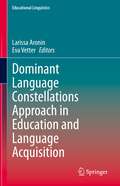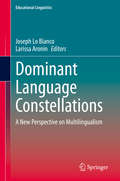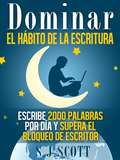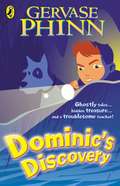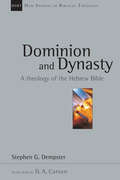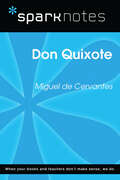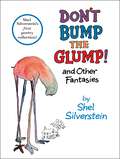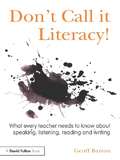- Table View
- List View
Doing care and doing economy: On the ecology of social and economic life
by Wolf Rainer WendtA book on the need to do economy in a caring way in the global crisis. In this situation, doing care and doing economy are mutually dependent. The context that is described is a multifaceted and complex one. It concerns social care, state action and the responsibility of companies. All actors are involved in caring and managing within an ecological framework for a development that is beneficial to life both locally and globally.
Doing the Public Good: Latina/o Scholars Engage Civic Participation
by Kenneth P. Gonález Raymond V. PadillaHow can scholars reconnect themselves—and their students—to higher education’s historic but much diluted mission to work for the public good?Through the lenses of personal reflection and auto-ethnography—and drawing on such rich philosophical foundations as the Spanish tradition of higher learning, the holistic Aztec concept of education, the Hispanic notion of bien educado, and the activist principles of the Chicano movement–these writers explore the intersections of private and public good, and how the tension between them has played out in their own lives and the commitments they have made to their intellectual community, and to their cultural and family communities.Through often lyrical memoirs, reflections, and poetry, these authors recount their personal journeys and struggles—often informed by a spiritual connectedness and always driven by a concern for social justice—and show how they have found individual paths to promoting the public good in their classrooms, and in the world beyond.Contributors include: Jennifer Ayala; Dolores Delgado Bernal; Flora V Rodriguez-Brown; Kenneth P. Gonzales; Miguel Guajardo; Francisco Guajardo; Aida Hurtado; Maria A. Hurtado; Arcelia L. Hurtado, Raymond V. Padilla; Caroline Sotello Viernes Turner; and Luis Urrieta Jr.
Doing the Right Thing Participant's Guide: Making Moral Choices in a World Full of Options
by Charles W. Colson Robert GeorgeDoing the Right Thing explores the ethical and moral breakdown that is hitting culture from all sides. Through panel discussions, interviews, and live student questions it raises ethical issues in a non-condemning but challenging way, stimulating thought, discussion, and action. This participant’s guide encourages people to examine themselves and how ethical and character issues relate to their lives at home, school, and the workplace. As a result of this discussion and self-examination, participants will exhort each other and promote an ethic of virtue in their spheres of influence and in the culture at large. This examination of ethics consists of six sessions, each designed to be completed in approximately one hour. Each session consists of approximately thirty minutes of video and thirty minutes of discussion. Session topics include: How did we get into this mess? Is there truth, a moral law we all can know? If we know what is right, can we do it? What does it mean to be human? Ethics in the market place Ethics in public life Designed for use with the video.
Doing the Right Thing for Children
by Thomas Schultz Maurice SykesMaurice Sykes has made advocating for and advancing high-quality early childhood education his life's work. Through mentorships, presentations, and personal example, Maurice challenges and inspires educators to become effective leaders who make a difference in children's lives. He does the same in this book as he shares stories of the hills and valleys of his personal and professional journeys throughout the presentation of eight core leadership values: human potential, knowledge, social justice, competence, fun and enjoyment, personal renewal, perseverance, and courage.Use this book to develop the skills, knowledge, and habits of mind you need to be a successful leader--and do the right thing for children, whether you serve at the individual, organizational, or classroom level.Maurice Sykes directs the Early Childhood Leadership Institute at the University of the District of Columbia's National Center for Urban Education.
Doing the Right Thing: How Colleges and Universities Can Undo Systemic Racism in Faculty Hiring
by Marybeth GasmanAn honest confrontation of systemic racism in faculty hiring—and what to do about itWhile colleges and universities have been lauded for increasing student diversity, these same institutions have failed to achieve any comparable diversity among their faculty. In 2017, of the nation’s full-time, tenure-track and tenured faculty, only 3 percent each were Black men, Black women, Hispanic men, and Hispanic women. Only 6 percent were Asian/Pacific Islander men, 5 percent were Asian/Pacific Islander women, and 1 percent were American Indian/Alaska Native. Why are the numbers so abysmal? In Doing the Right Thing, Marybeth Gasman takes a hard, insightful look at the issues surrounding the recruitment and hiring of faculty of color. Relying on national data and interviews with provosts, deans, and department chairs from sixty major universities, Gasman documents the institutional forces stymieing faculty diversification, and she makes the case for how such deficiencies can and should be rectified.Even as institutions publicly champion inclusive excellence and the number of doctoral students of color increases, Gasman reveals the entrenched constraints contributing to the faculty status quo. Impediments to progress include the alleged trade-off between quality and diversity, the power of pedigree, the rigidity of academic pipelines, failures of administrative leadership, lack of accountability among administration and faculty, and the opacity and arbitrariness of the recruitment and hiring process. Gasman contends that leaders must acknowledge institutional failures of inclusion, pervasive systemic racism, and biases that restrict people of color from pursuing faculty careers.Recognizing that individuals from all backgrounds are essential to the creation and teaching of knowledge, Doing the Right Thing puts forth a concrete call for colleges and universities to take action and do better.
Doing the Right Things Right: How the Effective Executive Spends Time
by Laura StackA How-To Guide for the Modern LeaderInspired by Peter Drucker's groundbreaking book The Effective Executive, Laura Stack details precisely how 21st-century leaders and managers can obtain profitable, productive results by managing the intersection of two critical values: effectiveness and efficiency.Effectiveness, Stack says, is identifying and achieving the best objectives for your organization—doing the right things. Efficiency is accomplishing them with the least amount of time, effort, and cost—doing things right. If you're not clear on both, you're wasting your time. As Drucker put it, "There is nothing so useless as doing efficiently that which should not be done at all." Stack's 3T Leadership offers twelve practices that will enable executives to be effective and efficient, grouped into three areas where leaders spend their time: Strategic Thinking, Teamwork, and Tactics. With her expert advice, you'll get scores of new ideas on how you, your team, and your organization can boost productivity.
Dokumentarische Unterrichtsforschung in den Fachdidaktiken: Theoretische Grundlagen und Forschungspraxis (Rekonstruktive Bildungsforschung #31)
by Barbara Asbrand Matthias Martens Thade Buchborn Jürgen MentheDer Band untersucht das Potenzial der Dokumentarischen Methode für die Erforschung fachlichen Lehrens und Lernens. Dazu werden in der erziehungswissenschaftlichen und fachdidaktischen Unterrichtsforschung erprobte methodische Ansätze und gegenstandsbezogene Erträge zusammengeführt. Im Fokus steht die forschungsmethodische Berücksichtigung von Materialität, Multimodalität und Simultaneität der Unterrichtsinteraktion sowie Möglichkeiten zur Rekonstruktion von Lernprozessen und der Fachlichkeit des Unterrichts. Mit der Zusammenschau wird eine interdisziplinäre Diskussion zwischen Erziehungswissenschaften und Fachdidaktiken ermöglicht und für eine Reflexion zugänglich gemacht.
Dokumentarisches Interpretieren als reflexive Forschungspraxis: Erträge einer dokumentarischen Arbeitsgruppe
by Katharina Graalmann Sylvia Jäde Nora Katenbrink Daniel SchillerDer Sammelband fokussiert im ersten Teil Genese und Funktion der Arbeitsgruppe Dokumentarische Methode (AG DM), die Elemente einer Forschungswerkstatt und Interpretationsgruppe ineinander vereint. Dabei geht es neben Aspekten „klassischer“ Interpretationspraxis vor allem auch um Fragen der Aushandlung geteilter Grundannahmen im methodologischen Denken und Analysieren. Der zweite Teil speist sich aus methodologisch-methodischen Einzelbeiträgen rund um die Dokumentarische Methode, deren jeweilige Problemstellungen aus dem kollektiven Austausch innerhalb der AG DM resultierten. Damit leistet das Buch nicht nur einen Beitrag zum methodologischen-methodischen Diskurs, sondern hebt anhand handfester Beispiele den Mehrwert von einschlägigen qualitativen Arbeitsgruppen hervor.
Dolphin Ride: Independent Reading Gold 9 (Reading Champion #207)
by Jill AtkinsLexi and her dad are on a boat trip to spot dolphins. And when Lexi makes a wish to ride a dolphin, she is taken on a magical dream ride.Reading Champion offers independent reading books for children to practise and reinforce their developing reading skills.Fantastic, original stories are accompanied by engaging artwork and a reading activity. Each book has been carefully graded so that it can be matched to a child's reading ability, encouraging reading for pleasure.
Dolphins (Readers)
by Melissa StewartEveryone loves the smile on a dolphin&’s face. Though smart enough to become theme park tricksters, dolphins are first and foremost wild mammals. Melissa Stewart&’s lively text outlines our responsibility to conserve their natural environment. This high-interest book also offers an interactive experience to boost awareness of these adorable creatures.National Geographic supports K-12 educators with ELA Common Core Resources.Visit www.natgeoed.org/commoncore for more information.
Domain Adaptation and Representation Transfer, and Distributed and Collaborative Learning: Second MICCAI Workshop, DART 2020, and First MICCAI Workshop, DCL 2020, Held in Conjunction with MICCAI 2020, Lima, Peru, October 4–8, 2020, Proceedings (Lecture Notes in Computer Science #12444)
by M. Jorge Cardoso Shadi Albarqouni Spyridon Bakas Bennett Landman Fausto Milletari Nicola Rieke Ziyue Xu Konstantinos Kamnitsas Wenqi Li Holger Roth Daguang XuThis book constitutes the refereed proceedings of the Second MICCAI Workshop on Domain Adaptation and Representation Transfer, DART 2020, and the First MICCAI Workshop on Distributed and Collaborative Learning, DCL 2020, held in conjunction with MICCAI 2020 in October 2020. The conference was planned to take place in Lima, Peru, but changed to an online format due to the Coronavirus pandemic. For DART 2020, 12 full papers were accepted from 18 submissions. They deal with methodological advancements and ideas that can improve the applicability of machine learning (ML)/deep learning (DL) approaches to clinical settings by making them robust and consistent across different domains.For DCL 2020, the 8 papers included in this book were accepted from a total of 12 submissions. They focus on the comparison, evaluation and discussion of methodological advancement and practical ideas about machine learning applied to problems where data cannot be stored in centralized databases; where information privacy is a priority; where it is necessary to deliver strong guarantees on the amount and nature of private information that may be revealed by the model as a result of training; and where it's necessary to orchestrate, manage and direct clusters of nodes participating in the same learning task.
Domestic Abuse Safety Planning with Young Children: A Professional Guide (Safety Planning with Young Children)
by Catherine LawlerThis guidebook is an essential companion to the Pilgrim’s Bumpy Flight story and is designed to be read by professionals to ensure the effective and safe use of the storybook. Pilgrims Bumpy Flight has been created to help young children aged 5–7 experiencing domestic abuse, to explore the concepts of physical and emotional safety. Safety planning with a child offers a way to help them vocalise their feelings and understand what to do when something does not feel right. The professional guide will help supporting adults facilitate safety planning that is experienced as emphatically curious, safe and where the child’s opinion matters. It provides up-to-date information on domestic abuse, childhood trauma, practice tips and how to complete a safety plan with a young child using the storybook as the key vessel of communication and exploration. Key features include: • Accessible information about domestic abuse and coercive control based on the latest research. • Guidance around direct work and safety planning with young children. • Practical activities building off Pilgrim’s story, including printable material. • Things to consider and ways to use the storybook to facilitate a conversation with a child, as well as page-by-page helpers notes on the narrative. • A comprehensive list of helplines and organisations in place to support adult victims/survivors of domestic abuse. Used alongside the storybook, this professional guide is a crucial tool for the early years sector, education staff and those working in children’s services, including safeguarding officers, family support workers, social workers and children’s IDVAs. Both books should be used in tandem with agency policy, procedure and guidance.
Domestic Economic Abuse: The Violence of Money (Routledge Advances in Sociology)
by Supriya SinghSupriya Singh tells the stories of 12 Anglo-Celtic and Indian women in Australia who survived economic abuse. She describes the lived experience of coercive control underlying economic abuse across cultures. Each story shows how the woman was trapped and lost her freedom because her husband denied her money, appropriated her assets and sabotaged her ability to be in paid work. These stories are about silence, shame and embarrassment that this could happen despite professional and graduate education. Some of the women were the main earners in their household. Women spoke of being afraid, of trying to leave, of losing their sense of self. Many suffered physical and mental ill-health, not knowing what would trigger the violence. Some attempted suicide. None of the women fully realised they were suffering family violence through economic abuse, whilst it was happening to them. The stories of Anglo-Celtic and Indian women show economic abuse is not associated with a specific system of money management and control. It is when the morality of money is betrayed that control becomes coercive. Money as a medium of care then becomes a medium of abuse. The women’s stories demonstrate the importance of talking about money and relationships with future partners, across life stages and with their sons and daughters. The women saw this as an essential step for preventing and lessening economic abuse. A vital read for scholars of domestic abuse and family violence that will also be valuable for sociologists of money.
Domestic Violence and Children: A Handbook for Schools and Early Years Settings
by Abigail Sterne Liz PooleWhat can schools and social care workers do to help children affected by domestic violence? Large numbers of children are affected by domestic violence. The problem crosses every social class and culture. It causes distress and anxiety in children and adversely affects their learning and play, as well as their behaviour, wellbeing and attendance. Education staff may know of a child or family in crisis, want to help, yet feel outside their comfort zone, grappling with a complex issue not covered in their training. This book describes the impact of domestic violence on children and provides support for education and social care professionals. It takes heavy workloads into account and suggests practical ways of meeting the needs of pupils who come from difficult home backgrounds. The authors provide guidance and advice on: identifying and responding to signs of distress helping pupils to talk about and make sense of their experiences the impact on parenting and how parents can be supported the needs of young people in refuges and temporary accommodation pupil safety and government safeguarding guidelines educating young people and the community about domestic violence specialist domestic violence services and other agencies that support schools. Domestic Violence and Children draws on the expertise of a wide range of professionals, including specialist domestic violence children’s workers and counsellors, psychologists, teachers, mentors and family support workers. It provides essential help and information to all children’s service directorates, as well as a range of professionals in education, social care, health and the voluntary sector.
Domestic Violence, Family Law and School: Children’s Right to Participation, Protection and Provision
by Maria Eriksson Linnéa Bruno Elisabet NäsmanDomestic Violence, Family Law and School discusses the ways in which domestic violence can impact on children's lives at pre-school and school. Disputes over parental responsibility, living arrangements or child contact can create difficulties not just for the child of disputing parents, but for all children at preschool or school, as well as for staff. This book uncovers new research on an under-explored area of children's lives and social work with vulnerable children and is shaped by a comparative lens that brings both similarities and differences between England, Wales and Sweden into focus. A theoretical framework for analyses of how welfare systems tackle domestic violence is elaborated and lessons for practice that can be drawn from the findings presented are highlighted.
Domestic Worker: Passbooks Study Guide (Career Examination Series)
by National Learning CorporationThe Domestic Worker Passbook® prepares you for your test by allowing you to take practice exams in the subjects you need to study. It provides hundreds of questions and answers in the areas that will likely be covered on your upcoming exam.
Dominant Beliefs and Alternative Voices: Discourse, Belief, and Gender in American Study (RoutledgeFalmer Studies in Higher Education)
by Joan Elias GoreThis book examines why study abroad is a marginal activity in American higher education and evaluates the role gender has played in the development and maintenance of this marginality.
Dominant Language Constellations Approach in Education and Language Acquisition (Educational Linguistics #51)
by Eva Vetter Larissa AroninThis volume is an important instalment in the rapidly expanding literature on multilingualism in education and language teaching. Within multilingual studies the volume is highly innovative in its application of the concept, theory and perspectives of the Dominant Language Constellations (DLC). The volume reports original research on language education policy and practice which address contemporary DLC-informed multilingualism within family settings and institutional domains such as teacher education, primary and secondary schooling, and higher education. Deploying the DLC concept as an analytical and conceptual category the chapters explore both personal and institutional life of multilingualism, enriched through visualizations. Specific chapters examine issues connected to career opportunities of adults of refugee background in Norway, multilingual transnational couples, and language teacher preparation in settings as diverse as Austria, Canada, Finland, Iceland, Israel, and the Basque Country and Catalonia in Spain. This volume is of direct relevance to coursework students and researchers pursuing programs in education, linguistics, applied linguistics, sociolinguistics and multilingualism, but will also attract interest in disciplines such as social work and psychology. Additionally the volume will appeal to members of the general public wishing to acquaint themselves with current research and thinking on critical issues in multilingual studies, such as learning experiences within and beyond classrooms, and aspects of public policy and institutional decision-making processes.
Dominant Language Constellations: A New Perspective on Multilingualism (Educational Linguistics #47)
by Joseph Lo Bianco Larissa AroninThis volume is dedicated to the concept and several applications of Dominant Language Constellations (DLC), by which it advances understanding of current multilingualism through addition of a novel perspective from which to view contemporary language use and acquisition. The term Dominant Language Constellation denotes the set of a person’s or group's most expedient languages, functioning as an entire unit and enabling an individual or group to meet their needs in a multilingual environment. The volume presents pioneering contributions that employ DLC as the lens for analysing a wide array of issues. These include multilingual syntactic development, cross-linguistic interaction and multilingual production in formal and informal educational contexts, as well as linguistic profiles of multilingual groups used in elementary school and higher education. Other DLC issues include discussions of how identity, emotions and attitudes operate in various minority and majority contexts. Because the DLC concept does not assume any inherent hierarchy of languages it can serve as a framework public policy in multilingual countries/communities faced with challenging policy determinations regarding choice of languages for use in education settings and more widely in social institutions and the economy. Some chapters develop and extend the DLC concept, others adapt and apply it to a variety of contexts, both global and local. Many chapters feature educational and social settings across large parts of the world– Africa, Australia, Europe, North America (Canada and the USA) and Southeast Asia. The volume can serve as supplementary reading for courses on multilingualism, sociolinguistics, language policy and planning, educational linguistics, Second and Third Language Acquisition.
Dominar El Hábito De La Escritura: Escribe 2000 Palabras Por Día Y Supera El Bloqueo De Escritor
by Natalia Steckel S. J. ScottAPRENDE:: Cómo eliminar el bloqueo de escritor para siempre y escribir MILES de palabras por día¿Te cuesta escribir todos los días? Muchas personas sueñan con convertirse en autores exitosos, pero no encuentran el tiempo para escribir. La verdad es que los grandes escritores no tienen más tiempo que tú. Se hacen el tiempo para escribir. No solo se hacen el tiempo, sino que siguen rutinas específicas de escritura que los ayudan a evitar el bloqueo de escritor.Al desarrollar el hábito de la escritura, tendrás la confianza para sentarte frente a la computadora todos los días con la seguridad de que las palabras fluirán. TU OBJETIVO:: Escribir 2000 palabras por día ¡todos los días!Uno de los factores clave para desarrollar CUALQUIER hábito de manera efectiva es elegir un objetivo específico y cuantificable. Entonces, si quieres convertirte en un escritor prolífico, debes establecer una cantidad específica de palabras para cada día. Si bien sugiero 2000 palabras como objetivo, puedes elegir cualquier cantidad que se acomode a tus ocupaciones. Puedes elegir 500 o 1000 palabras por día. O quizás tienes más tiempo que yo (o escribes más rápido) y decides escribir 3000 o 10 000 palabras diarias. Lo importante es establecer una cantidad y cumplir con ese objetivo.En Dominar el hábito de la escritura aprenderás cómo incorporar la escritura a tu rutina diaria. Lo que obtendrás es una estrategia y una lista de herramientas que te ayudarán a desarrollar un hábito sostenible de escritura y a eliminar el bloqueo de escritor. DESCARGA:: Dominar el hábito de la escritura: escribe 2000 palabras por día y supera el bloqueo de escritorDominar el hábito de la escritura contiene un plan de acción detallado sobre hábitos que puedes utilizar para desarrollar esta rutina.Con esta guía podrás hacer lo siguiente: *Establecer e
Dominic's Discovery
by Gervase PhinnDominic's middle name is trouble, but not because he's got a troublesome nature, but quite simply because he's ALWAYS in the wrong place at the wrong time. So it's not surprising that he's only allowed on the school trip to Thundercliff Bay - home to pirate legend, chilling ghost stories and lost treasure - by the skin of his teeth. Or that strict Mr Risley-Newsome, who has his beady eye on him, makes him stay at the youth hostel for forgetting his walking boots. What is surprising is that a very special discovery made by Dominic saves the day when the whole class is in serious danger, and proves to everyone that sometimes he can be in the right place at the right time.
Dominion and Dynasty: A Theology of the Hebrew Bible (New Studies in Biblical Theology #Volume 15)
by Stephen G. DempsterChristian theologians rarely study the Old Testament in its final Hebrew canonical form, even though this was very likely the Bible used by Jesus and the early church. However, once read as a whole, the larger structure of the Hebrew Bible (Tanakh) provides a "wide-angle lens" through which its contents can be viewed. In this stimulating New Studies in Biblical Theology volume, Stephen G. Dempster argues that, despite its undoubted literary diversity, the Hebrew Bible possesses a remarkable structural and conceptual unity. The various genres and books are placed within a comprehensive narrative framework which provides an overarching literary and historical context. The many texts contribute to this larger text, and find their meaning and significance within its story of "dominion and dynasty," which ranges from Adam to the Son of Man, from David to the coming Davidic king. Addressing key issues in biblical theology, the works comprising New Studies in Biblical Theology are creative attempts to help Christians better understand their Bibles. The NSBT series is edited by D. A. Carson, aiming to simultaneously instruct and to edify, to interact with current scholarship and to point the way ahead.
Don Quixote (SparkNotes Literature Guide Series)
by SparkNotesDon Quixote (SparkNotes Literature Guide) by Miguel de Cervantes Making the reading experience fun! Created by Harvard students for students everywhere, SparkNotes is a new breed of study guide: smarter, better, faster.Geared to what today's students need to know, SparkNotes provides:chapter-by-chapter analysis explanations of key themes, motifs, and symbols a review quiz and essay topics Lively and accessible, these guides are perfect for late-night studying and writing papers.
Don't Bump the Glump!
by Shel SilversteinIt's a zoo in here!Have you ever . . .Seen a Gritchen in your kitchen?Dared to dance with the One-Legged Zantz?Declined to dine with the Glub-Toothed Sline? You haven't? Well then, step inside—but only if you are ready to be amazed, tickled, astonished, and entertained by this most unusual bestiary of silly and scary creatures.Shel Silverstein combined his unique imagination and bold brand of humor for his first poetry collection—the only one he illustrated in full color. Now celebrating fifty years, Don't Bump the Glump! and Other Fantasies was originally published in 1964, the same year as his most famous picture book, The Giving Tree.
Don't Call it Literacy!: What every teacher needs to know about speaking, listening, reading and writing
by Geoff Barton"Every teacher in English is a teacher of English," said George Sampson, one of the early school inspectors, back in 1921. It’s never been truer, or more relevant. Literacy has a major impact on young people’s life-chances and it is every teacher’s responsibility to help build their communication, reading and writing skills. However, this book isn’t just about literacy; it’s also about what great teachers do in their classrooms, about applying knowledge consistently across classrooms, in order to help pupils to become more confident in their subjects. This book shows every teacher – whatever your subject – the simple steps which could transform your students into better speakers, listeners, readers and writers. Harnessing a range of straightforward, but powerful techniques, it shows you how to help each student in your subject to improve their spelling, to use the key vocabulary of your subject more accurately and to speak, read and write with confidence like a historian, scientist, designer or mathematician. The book is structured into clear sections which are then divided into short, easy-to-absorb units on the classroom implications of what we know about literacy. Don’t Call it Literacy! also includes: language commentaries which exemplify points made by the author; talking points at the end of each unit for self-assessment; a glossary for non-specialists; subject specific vocabulary for building students’ word power; tutor time spellings lists; a reading list on teaching, language, literacy and education. Written by a leading authority in the field, this book will help both trainee and practising secondary school teachers to turn their classroom into literacy-friendly environments, increasing the motivation and achievement of their students.
